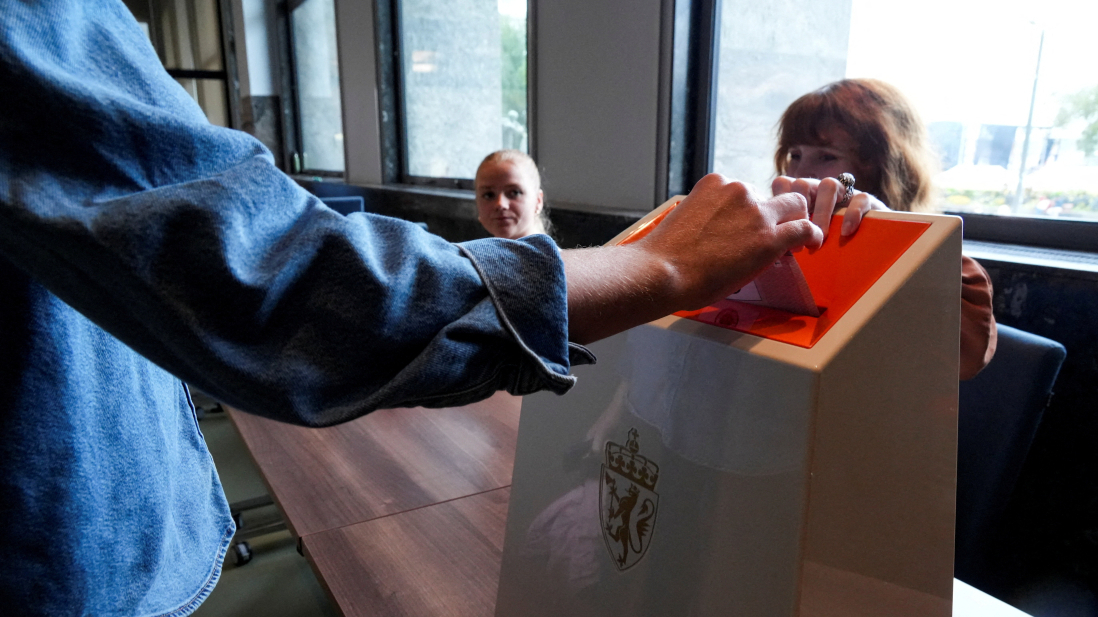European Parliament calls to suspend EU-U.S. trade deal citing 'tariff chaos'
The European Parliament’s trade chief has urged a temporary suspension of the EU–U.S. trade agreement approval, citing “tariff chaos” followin...

Norwegians head to the polls Monday on the final day of a close parliamentary election, with Prime Minister Jonas Gahr Stoere’s Labour Party narrowly favoured to win. Rising living costs, inflation, and global crises are shaping voter choices.
The left-wing bloc of Labour and four smaller parties is expected to win 88 seats, just above the 85-seat majority. This is down from the 100 seats they held after the 2021 election.
On the right, the populist Progress Party, the Conservatives, and two smaller groups look set to take the remaining 81 seats. The race is very close, and results may depend on how the smallest parties perform.
Voters have been focused on inflation, taxes, and public services. The election could also affect Norway’s oil and gas sector, Europe’s energy supply, and the management of the $2 trillion sovereign wealth fund.
Prime Minister Stoere, who has led the country since 2021, may benefit from international tensions, including the wars in Ukraine and Gaza. Analysts say his experience as a former foreign minister makes him appear steady and reliable.
At least nine parties are expected to win seats, but only the leaders of Labour, Progress, and the Conservatives are in contention for prime minister. Stoere may need support from the Communist Party and the Greens in a diverse “tutti frutti” coalition. These parties could push for stricter oil and gas limits, higher taxes on wealthy citizens, and more spending from Norway’s wealth fund.
Labour is polling at 27%, making it the largest party. The Progress Party is at 21%, ahead of the Conservatives at 14%. Disagreements between right-wing leaders Erna Solberg and Sylvi Listhaug over the prime ministership have left some voters uncertain about a right-wing government.
A seven-month-old Japanese macaque has drawn international attention after forming an unusual bond with a stuffed orangutan toy after being rejected by its mother.
Divers have recovered the bodies of seven Chinese tourists and a Russian driver after their minibus broke through the ice of on Lake Baikal in Russia, authorities said.
President Donald Trump said on Saturday (21 February) that he will raise temporary tariffs on nearly all U.S. imports from 10% to 15%, the maximum allowed under the law, after the Supreme Court struck down his previous tariff program.
Pakistan said it carried out cross-border strikes on militant targets inside Afghanistan after blaming a series of recent suicide bombings, including attacks during the holy month of Ramadan, on fighters it said were operating from Afghan territory.
Iran announced on Saturday (21 February) that it has designated the naval and air forces of European Union member states as “terrorist entities” in a reciprocal move after the EU blacklisted the Islamic Revolutionary Guard Corps (IRGC).
Further Iran-U.S. nuclear talks are scheduled in Geneva on Thursday (26 February) as diplomacy resumes over Tehran’s nuclear programme following earlier mediation efforts. But will the talks move Iran-U.S. negotiations closer to a deal, and what should be expected from the meeting?
China says it's making a "full assessment" of the U.S. Supreme Court's tariff ruling and urged Washington to lift "relevant unilateral tariff measures" on its trading partners, the Chinese commerce ministry said in a statement on Monday (23 February).
Start your day informed with AnewZ Morning Brief. Here are the top news stories for the 23rd of February, covering the latest developments you need to know.
A “Victory will be ours” banner was hung on the Russian Embassy in Seoul, ahead of the fourth anniversary of Russia’s full-scale invasion of Ukraine. It remains on display despite a request from the South Korean Foreign Ministry on Sunday (22 February) for its removal, sparking widespread criticism.
North Korea’s Workers' Party of Korea has re-elected Kim Jong Un as general secretary during the party congress in Pyongyang state media reported.
You can download the AnewZ application from Play Store and the App Store.

What is your opinion on this topic?
Leave the first comment